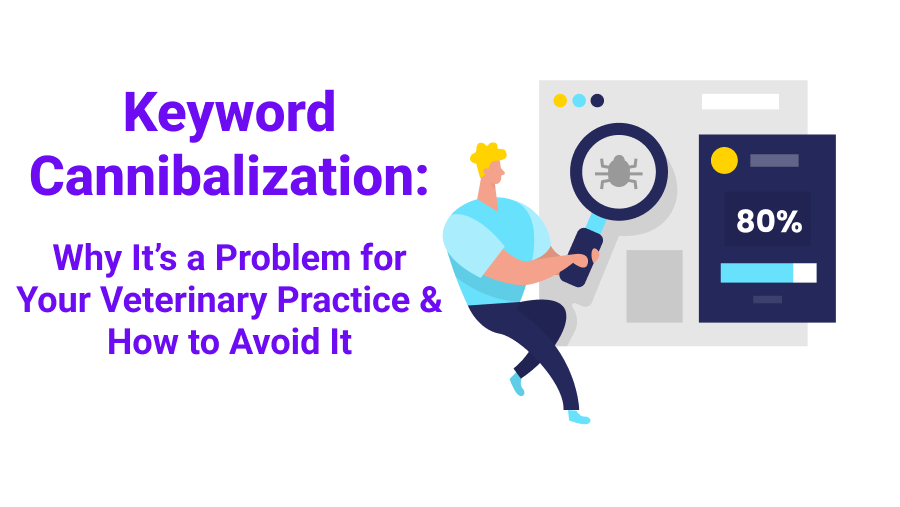Table of Contents
What Are Keywords?
What Is Keyword Cannibalization?
How Do You Know If You Have a Keyword Cannibalization Problem?
Ways to Fix Keyword Cannibalization
Improve Your SEO Strategy
Keyword Cannibalization: Why It’s a Problem for Your Veterinary Practice and How to Avoid It
Elliott Greenwood
May 19, 2023 · 3 min read

Keyword cannibalization can be a serious issue for your veterinary practice’s website visibility. Learn how to fix any of these issues and improve your pages' rankings.
Congratulations! You’ve created fantastic blog posts for your veterinary practice. You’ve done all the necessary keyword research, written a compelling blog post, and even included relevant anchor text for links. Now you just have to publish the blog and wait for it to rank.
Once you publish the page, however, you notice a problem: your page isn’t ranking like it should. This could be for a number of reasons, but the most likely is keyword cannibalization.
What Are Keywords?
Solid keywords are a key part to improving your site’s ranking on search engines.
Keywords are words or phrases that search engines use to understand search intent or the reason people are using a search engine. These search engines use keywords to determine what pages should show up when people search for certain terms.
By including them in the text of your webpages or blog posts tells search engines that your page is relevant to a particular search. This, in turn, means your page will show up in the search results.
This is why keywords and keyword research is so important. You’ll need to do keyword research to identify the right words to use for your veterinary practice, something that can be difficult and time-consuming.
What Is Keyword Cannibalization?
Using the most popular keywords can help your pages rank. However, you can’t use the same keyword every time.
Say you use a specific keyword for two blog posts. Search engines will take note of that. Because of this, you’ll have two pages competing in the rankings — which can negatively affect how many visitors you get to your site.
Alternatively, say you use different keywords, but have pages that are too similar to one another. Search engines can’t always distinguish between the two and may try to rank them against each other. This is what is known as keyword cannibalization.
Because this can cause issues with attracting visitors to the right pages, you’ll need to make sure this problem’s addressed effectively.
How Do You Know If You Have a Keyword Cannibalization Problem?
It’s pretty simple to figure out if you have a problem.
Pay close attention to your pages’ rankings.
If you notice some aren’t ranking well, plug “[your domain name] + [keyword you’re trying to rank for]” into a search engine.
This will show you what pages are ranking for what keywords. If you notice several pages competing against each other, you have a cannibalization issue.
Ways to Fix Keyword Cannibalization
If you aren’t yet convinced, keyword cannibalization is a problem that you need to address.
Thankfully, you have several options to fix the issue:
Do new keyword research.
Sometimes, pages cannibalize each other because they use the same exact keyword.
You can address the problem by doing new keyword research for one or multiple pages.
This way, you can use newer, more unique keywords that won’t hurt your ranking.
Merge similar pages.
You don’t need a lot of pages with similar content. As you have learned from this post, it could potentially be impacting your practice’s visibility.
If you do notice that you have a few pages that have very similar content, you might be able to merge the information, saving you the hassle of doing new keyword research.
Delete unwanted pages.
You might’ve created new pages on old topics to provide clients with updated information.
Obviously, you don’t necessarily need the old pages anymore — but if they’re still on your site, they could show up in search results.
Deleting old pages can help you avoid this issue.
Change internal linking.
Internal linking can help certain search engines determine which pages are important.
If you want one page to rank higher, include anchor text and internal links that lead to it.
This way, your page will have a better chance at ranking — even if there are other, similar pages.
Improve Your SEO Strategy
Keyword cannibalization can be a serious issue. It can have a big impact on how important pages rank. Thankfully, you can fix the issue.
Do additional keyword research
Merge pages
Have proper internal linking to help your pages rank.
Learn more about SEO metrics to track for your veterinary practice on our blog. Schedule a demo today to see how we can help you shape the future of your practice.
Are you a veterinary professional?
If you're in the veterinary field and you're interested in giving your practice the extra hands it desperately needs, book an 8 minute demo with Chckup. Our platform helps busy practices handle call overload, boost revenue per client, and increase client satisfaction by providing actionable insights and easy-to-use technology to help you stay on top of everything.
Book an 8 minute demo